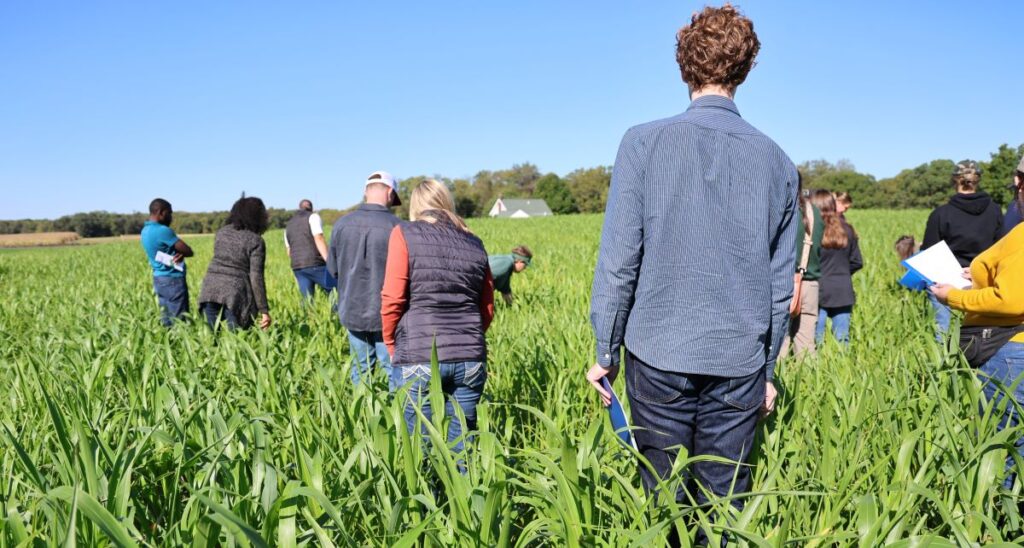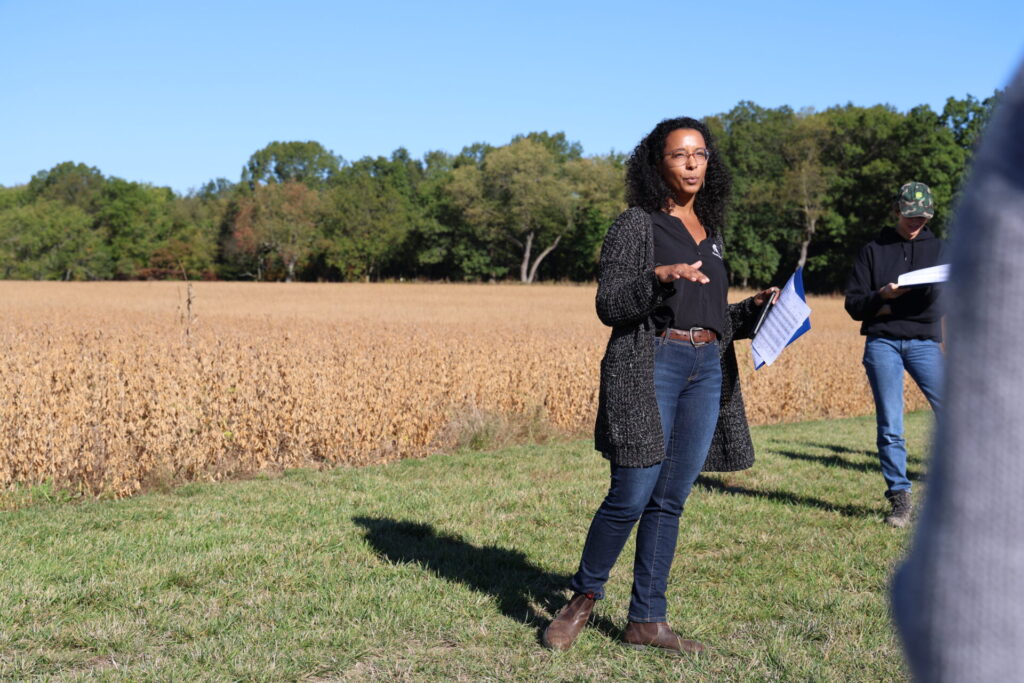
The Farmers for Soil Health (FSH) State Partner Education Meeting in Grand Rapids, Michigan, October 1-2, 2024, brought together Technical Assistance (TA) providers and Program Leaders to enhance understanding of FSH and sustainable agriculture practices.
More than two dozen attendees from 13 states and Washington, D.C., gathered at the event, presented by the Soil Health Institute (SHI) and the University of Missouri’s Center for Regenerative Agriculture (CRA) as part of the FSH Climate-Smart Commodities Partnership.
The FSH collaboration, covering 20 states across the Midwest, Great Lakes, and Chesapeake Bay, aims to boost cover crop adoption on 30 million corn and soy acres by 2030. SHI and CRA lead the FSH education team, collaborating with technical assistance leads in each state to offer education and resources for successful adoption of soil health management systems.
Day 1 Highlights
The session began with Jack Cornell from the U.S. Soybean Board and Greg Pilchak from the National Fish and Wildlife Foundation, who provided insights and updates on FSH-related programs and initiatives. Cornell highlighted the importance of soil health in sustainable farming and the collective efforts being made by the commodity organizations to promote these practices through the FSH Initiative, while Pilchak provided programmatic information and updates.
Blake Sullivan and TJ Flax from DTN showcased the FSH Enrollment and Sustainability Marketplace Platforms. Sullivan provided hands-on demonstrations including enrollment procedures and the State TA Portal, and Flax presented the Marketplace portion of the session. These tools are designed to empower TAs and farmers by providing them with the resources needed to engage with various FSH opportunities.
During the break, attendees networked and shared ideas with fellow participants, followed by a wrap up of the Marketplace and a Q&A session. The open session promoted engaging dialogue among TAs and other project partners while attendees could also seek hands-on support from the day’s guest speakers, fostering collaboration and knowledge sharing.
Day 2 Highlights

At the W.K. Kellogg Biological Station (KBS) Long-Term Agroecosystem Research (LTAR) Pavilion, attendees were greeted by researchers from Michigan State University (MSU) to share their work to promote sustainable farming and soil health.
Dr. Phil Robertson opened the session with a brief introduction to the LTAR, outlining its mission and significance in advancing sustainable agricultural practices. Dr. Brook Wilke shared critical insights into the successes and challenges faced by the LTAR, highlighting the importance of long-term research in shaping effective agricultural strategies.
Christine Charles presented compelling data comparing economic outcomes and yields from various farming practices, providing participants with valuable metrics to consider for their operations.
Rachel Drobnak discussed the benefits of integrating prairie strips into farming systems, emphasizing their role in enhancing soil health and biodiversity.

Kristin Poley of Michigan Corn Growers Association and the Corn Marketing Program of Michigan provided an overview of the organization’s support to KBS and the impact of LTAR research on Michigan’s grain commodities, illustrating how research translates into practical benefits for local farmers.
Soil health practices explored included cover crops, with Drs. Etienne Herrick and Dean Baas leading a session sharing practical tips for implementation and management. Dr. Kim Cassida discussed innovative strategies for integrating livestock into cropping systems, highlighting the synergies that can enhance soil health and farm productivity while inviting attendees to congregate in the field and test their skills identifying cover crop species.
Drs. Manni Singh, alongside Brook Wilke, introduced cutting-edge crop innovations that are reshaping agricultural practices. Rich Price shared insights into the role of precision technology in modern agriculture, demonstrating how data-driven approaches can optimize soil management. Christine Charles and Dr. Nameer Baker wrapped up the session by discussing the significant findings from the Long-Term Ecological Research (LTER) on no-till farming and cover crops, reinforcing the benefits of these practices for sustainable agriculture.

After an engaging morning, participants took a wagon ride back to the buses for lunch at KBS’ McCrary Dining Hall. This provided an opportunity for networking and discussions among peers and speakers.
The day continued with a visit to Third Leaf Farm, a 140-acre third-generation apple orchard located about 30 miles northeast of Grand Rapids. Participants learned how soil health, including the use of cover crops, are being implemented to promote farm resilience. Day 2 wrapped up with tasting a wide variety of apples and learning about the process of preparing the beehives for winter.
The FSH team thanks all the speakers, attendees, and partners who made this event possible. Their commitment to advancing soil health is vital for sustainable agriculture and the health of our environment.
For updates, future events, and resources, follow Farmers for Soil Health on Facebook, Instagram, and YouTube and check out the FSH website.